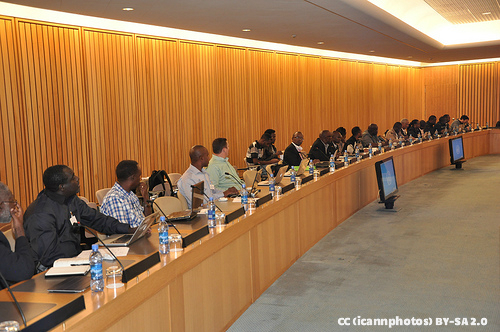NetMundial: what’s new and where does it fit in the Internet Governance environment?
by Digital Rights LAC on March 1, 2014
In April 23 and 24 São Paulo will host the Global Multistakeholder Meeting on the Future of Internet Governance, also called NetMundial, a diplomatic event willing to debate Internet Governance Principles and a roadmap for the future evolution of the Internet Governance Ecosystem.
By Joana Varon
Despite the series of diplomatic meetings and conferences that already exist surrounding the Internet Governance agenda, this meeting has captured particular attention of representatives from civil society, academia, the technical community and the private sector worldwide. As such, since last October, it has been one of the main issues of controvercial and passionate debates in mailing lists focused on Internet Governance.
All this effervescence is not for little, as the meeting comes in a very different political scenario. While the threat of the International Telecommunication Union – ITU taking over internet issues was not materialized during the World Conference on International Telecommunications – WCIT , in Dubai, it became evident that the current gap of the institutional framework for addressing some internet governance issues cannot remain unsolved. That evidence was even clearer in face of the revelations of mass surveillance from the Five Eyes countries as, so far, targeted countries still have not come up with a solution to properly address the matter in the international arena or to avoid the ever-rising risk of cyberspace becoming a real battlefield. In face of that scenario, even the technical community, which until after Dubai was against addressing any attempt of reform, has declared in the Montevideo Statement that “they have identified the need for ongoing effort to address Internet Governance challenges, and agreed to catalyze community-wide efforts towards the evolution of global multistakeholder Internet cooperation.”
One could say that, in this same political scenario, other important processes on internet governance are also underway. Particularly the review of the World Summit of Information Society – WSIS , the preparations for the Plenipotentiary meeting of the ITU and the continuation of the tasks from the Working Group on Enhanced Cooperation – WGEC . Nevertheless, so far, repercussion involving these processes have been much less vibrant then what we can observe regarding NetMundial.
I would say that’s because, aside from the common political context which reinforces the need for a way forward on the internet governance debate, NetMundial will be convened in a different structure then all these UN meetings. Though its goal is to have enforceable outcomes – which ultimately means that, as in the UN system, States will need to have the final word on the implementation of whatever is the conclusion – NetMundial is being organized as a multistakeholder event, where representatives from governments, private sector, civil society, technical community and academy are finally shaping together the agenda and all the other aspects of the meeting organization.
This aspect is a meaningful differential, as governments are not simply leading the process and only inviting other stakeholder groups. This is happening, for instance, in the current WSIS review. On the other hand, proposing a multistakeholder meeting also represents one of the major challenges. Determining representativeness for the other stakeholders groups, apart from States, is very hard. And, as opposed to what happens in other internet governance arenas, bringing a wide range of government representatives, including from developed countries, for a truly multistakeholder process, is also being a complicated part of the process.
Nevertheless, another differential is that NetMundial has very ambitious goals to be addressed in a very short timeframe. From all these aspects, it is, indeed, a task against the status quo. Such goals not only run in parallel but also, with the intention to fill institutional gaps, are vital for really achieving the mandate of the other meetings mentioned above.
As part of the process to achieve such goals, a consultation has been opened at NetMundial website and submissions are to be made until March, 1st. To accomplish this deadline, civil society organizations are articulating themselves and debating what would be a minimum common denominator that should be reinforced in the final outcome of the event. So far, in my personal interpretation from following different consultations within Brazilian civil society and within the BestBits networks, it is possible to extract that debates within this stakeholder groups are leading to the following broad conclusions:
>> Human rights principles should be highlighted as core principles to be enforced on global internet governance;
>> A set of procedural principles should also be set to ensure that values such as transparence; wide, open and diverse participation of all the stakeholders in decision making processes; effectiveness and accountability are enforced;
>> Internet Governance framework should remain decentralized, aim multistakeholderism, be adaptable in a way that the right expertise is convened to address a particular set of problems and the final solution should be enforceable and aligned with the Human Rights principles previously highlighted.
>> The Internet Governance Forum should be reformed and empowered at least in order to function as a clearing house to feed an eventual coordination mechanism that enables internet policy-making spaces to co-exist.
Of course, there are several ways to materialize this general assessments, which, hopefully, will be presented in the online contributions. On the other hand, even these general points cannot be easily accepted by other stakeholder groups, therefore, all these contributions will have to serve as input for the next stage: a cross-community consensus building process.
This will be an even harder task, a process to be developed until the participants of the meeting are finally assembled in Sao Paulo, on April, 23rd and 24th. Besides other gatherings, part of this cross-community debate shall be performed at the Global Online Forum of 1net platform, so, even if you haven’t had the chance to contribute submitting your ideas to the consultation process, there will be other steps ahead. Stay tuned.






